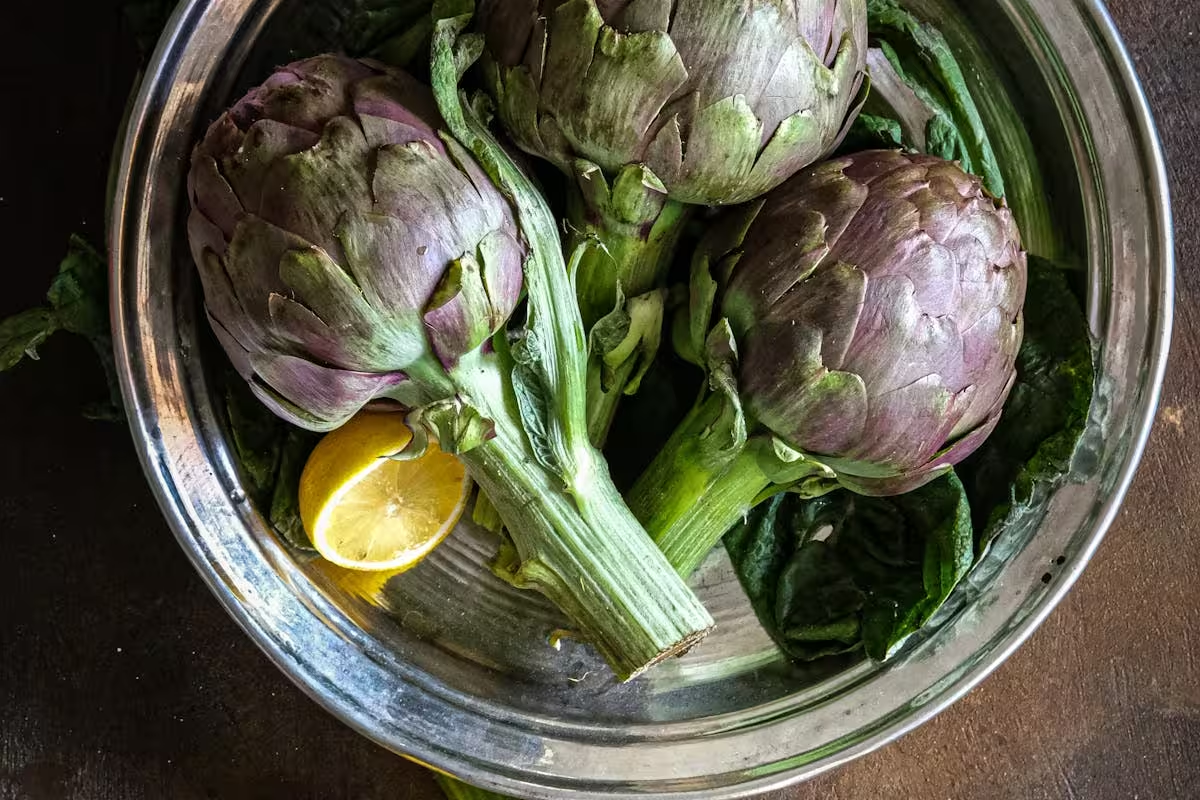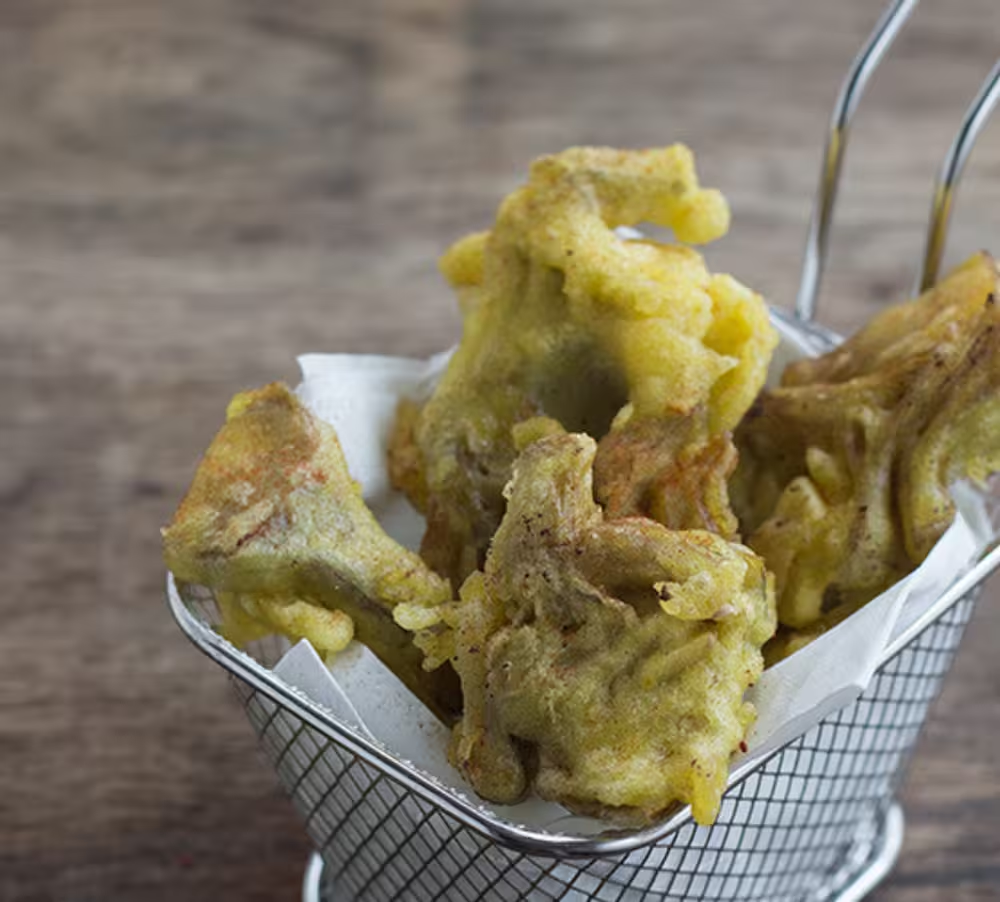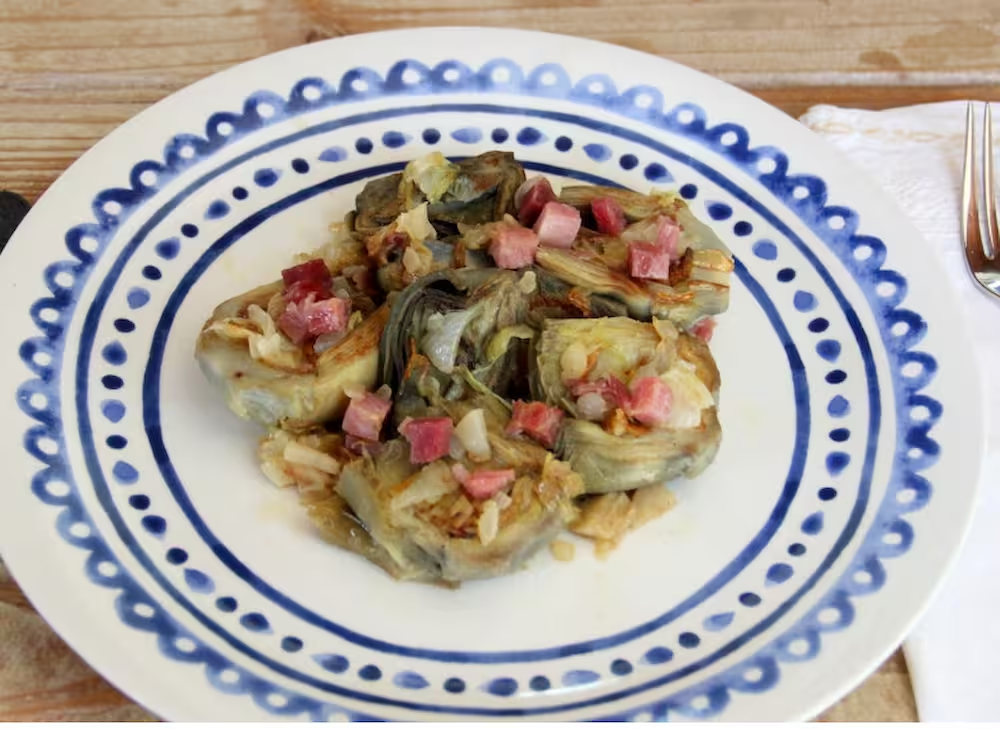In this article, we will describe the medicinal properties of artichokes as food, as well as their nutritional value.
Additionally, we will highlight some capsule supplements made from artichoke extract, as well as any adverse effects we should be aware of.
What are artichokes?
Artichokes, also scientifically known as “Cynara scolymus”, are plants cultivated as food in temperate climates. These plants belong to the Cynara genus within the Asteraceae family (1).
In reality, it is considered a domesticated species since it can be cultivated, and its origin derives from the wild species Cynara cardunculus and Cynara horrida, both native to the Mediterranean flora (Italy, France, Morocco, Spain, Cyprus, etc.) (3).
They are usually harvested and consumed between September and May, as this is their best season, with the early season in September and October, and the late season in April and May.
Artichokes are perennial plants that can reach up to 150 cm in width, regrowing from the stump every year after winter. Their leaves are light green on the upper side and covered with white fibrils on the underside, giving them a pale appearance.
The skill in their cultivation dates back to the Renaissance and is attributed to Italian farmers, from where it spread to Mediterranean countries. In Spain, they were introduced by the Arabs, calling them “all-karcguff” (1).
Nutritional composition of artichokes
The nutritional composition of this plant is shown in the following table (2):
|
Nutritional component |
Per 100 g of edible portion |
Per serving (300 g) |
|---|---|---|
| Energy (Kcal) | 44 | 48 |
| Total lipids (g) | 0.1 | 0.1 |
| Proteins (g) | 2.3 | 2.5 |
| Carbohydrates (g) | 7.5 | 8.1 |
| Fiber (g) | 2 | 2.2 |
| Water (g) | 88.1 | 95.1 |
| Potassium (mg) | 430 | 464.4 |
| Phosphorus (mg) | 130 | 140.4 |
| Calcium (mg) | 45 | 48.6 |
In this compositional table, we can observe that the major component is water, followed by carbohydrates, highlighting inulin and fiber.
Regarding mineral content, potassium and phosphorus stand out in greater quantity. For this reason, artichokes could contribute to the proper functioning of the nervous system and muscles due to their high potassium content. Additionally, they contribute to the strengthening of bones and teeth, derived from the properties of phosphorus (1).
On the other hand, as we can see, this food plant contains very few calories, only 44 kcal per 100 g of edible portion.
A serving of artichokes covers 20% of the recommended phosphorus intake for the study population (1).
Related commercial species
In the market, three species are known that are morphologically or by common name related to the true artichoke, sometimes even causing confusion.
The closest to it is the “Cardoon,” whose phenotype is very similar and also belongs to the same genus. This species is scientifically known as Cynara cardunculus, from which the fleshy ribs of the leaves are consumed, just as with the more primitive artichokes (10).
Another species is the “Jerusalem artichoke” whose scientific name is Helianthus tuberosus. It also belongs to the Compositae family, although it is of the same genus as the sunflower and with similar flowers that orient themselves in the same way to the sun (10).
The third species is the “Chinese artichoke,” whose scientific name is Stachis sieboldii . However, phytologically, it is very far from the true artichoke.
Medicinal properties of artichokes
Active and functional compounds
The artichoke is a highly recommended vegetable in the regular diet of any person due to its high content of phytochemicals, especially phenolic acids and flavonoids, in addition to terpenes, which offer a wide variety of properties (9).
The major compounds of this plant are chlorogenic acid and its derivatives (hydroxycinnamic acids), cynarin, a specific compound of plants of the Cynara genus; and finally, luteolin, a flavone generally found in the leaves and stem. These nutritional components of Cynara scolymus offer antioxidant properties (9).
According to Tixie, the Frenchman Guitteau, as a great writer, suggested that one of the main active compounds of artichokes is Cynarin, responsible for the most important therapeutic actions of Cynara Scolymus (4).
However, the therapeutic properties of cynarin gain scientific evidence due to the works of Chabrol et al., conducted in 1931, in which the insoluble salt of cynarin was isolated (5).
Due to the discovery of cynarin, several therapeutic trials have been conducted with infusions and extracts based on this compound, previously extracted from artichoke leaves. Therefore, it has been concluded that its main therapeutic actions are:
- Choleretic and cholagogue action.
- Diuretic ureoeliminator action.
- Hypocholesterolemic action.
- Hepatoprotective and antitoxic action.
Dietary/diuretic phytotherapy
In phytotherapy, infusions, decoctions, and extracts of artichoke leaves, which have a somewhat bitter taste, are used, while in dietetics, as well as traditional food, young flowers and their bracts are used (3).
The diuretic function is related to several components such as malic, citric, glyceric, succinic, and lactic acids, which also have a choleretic power (16).
Additionally, thanks to the high content of flavonoids derived from luteolin (cynarosides and scolimosides) and their great contribution of potassium mineral salts, the artichoke exerts a diuretic action (16).
Non-alcoholic fatty liver disease
Non-alcoholic fatty liver disease is very common worldwide among chronic liver diseases. However, it is highly treatable.
Therefore, in 2018, the efficacy of artichoke leaf extract (ALE) in non-alcoholic fatty liver disease was examined, in which 100 people with this disease were selected and administered 600 mg daily of the extract or placebo for a period of 2 months.
Finally, it was concluded that supplementation with ALE reduced total cholesterol, low and high-density lipoprotein cholesterol, non-high-density cholesterol, and triglyceride concentrations, demonstrating the beneficial effects of supplementation with this plant both in liver parameters visualized in ultrasound and in serum liver parameters (11).
Artichoke leaf extract (ALE) has shown potential as a hepatoprotective agent (11).
[article ids=”47370″] Another study by Kulza, M. et al. (2012) stated that one of the plants with hepatoprotective action is the artichoke (Cynara scolymus L.). It highlighted that plant-based extract medications, in this case, artichokes, regardless of the species, have protective properties on the parenchyma that damages the organs.
Therefore, the daily consumption of artichoke extract with cytoprotective compounds could increase the efficacy of liver treatment and reduce side effects (13).
Cardiovascular diseases
Since a high consumption of vegetables has been associated with reduced mortality in various cardiovascular diseases, cerebrovascular disease (CVD), and ischemic heart disease (IHD), an ecological study conducted in 2020 proposed the following hypothesis:
“The diversity in vegetable and artichoke production, used as indicators of their consumption, could be associated with the diversity of mortality rates (12).”
To test this hypothesis, smoothed standardized mortality ratios (SMR) of cardiovascular, CVD, and IHD mortalities and an age-adjusted mortality rate were estimated.
The results showed that vegetable and artichoke production can act as protective factors against mortality from cardiovascular and cerebrovascular disease (12).
Another study conducted in 2015 by Ben Salem, M. et al. on artichoke leaf extract and its health benefits evidenced the antioxidant, choleretic, hepatoprotective, bile-enhancing, and lipid-reducing effects of this plant.
Additionally, it was proposed that artichokes may play an important role in reducing cholesterol and, therefore, help combat heart diseases (13).
Other medicinal and therapeutic properties
Other secondary therapeutic actions we can mention are its hypoglycemic effect and the acceleration of carbohydrate oxidation, due to an oxidase that seems to increase its activity with disodium phosphate and potassium malate (6).
Tixier et al. reported the use of this plant in various skin diseases, such as common eczema, urticaria, prurigo screfulus, and other common pediatric conditions. This was proven in the pediatric hospital section where he worked for many years (8).
Ravina discovered the efficacy of artichoke-based treatment in vertigo, headaches, and cases of cerebral arteriosclerosis (7).
What supplements exist with artichoke extract?
There are a large number of commercial supplements made with artichoke extract used for the treatment of various pathologies or diseases. Below are 2 examples where you can quickly and easily purchase the products.
Artichoke Extract – 360 Capsules- TRUE NATURE®
This supplement based on artichoke extract contains 360 capsules of French origin, with 2.5% cynarin. Additionally, it contains a high dosage, that is, 2400 mg, of which 60 mg are provided through cynarin.
This product is 100% VEGAN, completely natural, and contains no gluten or additives like magnesium stearate.
Este suplemento a base de extracto de alcachofa contiene 360 cápsulas de origen francés, con un 2,5 % de ciarina. Además, contiene una alta dosificación, es decir 2400 mg ,de los cuales 60 mg son aportados a través de la cinarina.
Este producto es 100% VEGANO, totalmente natural, no contiene gluten ni aditivos como el estearato de magnesio.
Recommended dosage
The recommended dosage depends on the type of disease or pathology the person has. Below are some examples (16):
- If you have Irritable Bowel Syndrome, the recommended dosage is 320-640 mg (1 or 2 tablets), 1 to 3 times a day at most, with meals, for a minimum of 8 weeks.
- If you have digestive problems mentioned, it is recommended to take 320 or 640 mg of e.e (1-2 tablets) per day, 1 hour before meals, unless you experience stomach discomfort such as heartburn or acidity, in which case it is recommended to take it just at the start of the meal.
- In case of constipation, 640 mg of artichoke extract, which corresponds to 2 tablets, 1 to 3 times a day, with meals.
Side effects
Concentrated supplements with artichoke extract may pose some risks if we do not take the appropriate doses. Therefore, it is important to exercise caution if there is any obstruction of the bile ducts or if you suffer from gallstones, as it could lead to colic due to the gallbladder-stimulating effect of this plant (15).
In cases of mothers in the lactation period, some experts also do not recommend the consumption of artichokes, as it could cause a change in the taste of breast milk, as well as provide galactofuge properties and decrease milk production (15).
3 Recipes with artichokes
In this section, we will see some of the most typical recipes with artichokes (17):
Artichokes in saffron tempura
The ingredients for 4 people are:
- 1 kg of artichokes
- Iced water
- Salt
- Wheat flour
- Saffron
- Paprika from La Vera
- Extra virgin olive oil
The preparation process includes the following steps:
- Clean the artichokes and boil them in salted water for about 15 minutes
- To make the tempura, mix the flour with iced water and a little saffron. The batter should be like custard.
- Heat plenty of olive oil in a deep pan, drain the artichokes well, and add them with the tempura batter.
- Fry until golden and place on absorbent paper to drain excess oil.
- Serve with a little paprika.
Artichokes with shrimp and lemon
The ingredients for 2 people are:
- 6 artichokes
- 1 lemon
- 1 garlic clove
- 100 g of cooked shrimp
- parsley
- 10 ml of apple cider vinegar
- 100 ml of white wine or fish broth
- extra virgin olive oil
- black pepper
- salt
The steps to make this recipe are:
- Peel the artichokes and cut the hearts in half
- Chop the garlic clove and brown it in a pan.
- Add the artichokes and the wine, letting it evaporate a bit, and add another sprig of parsley, the juice of half a lemon, apple cider vinegar, and water or broth, just enough to cover them.
- Cover and cook over medium heat for about 10-15 minutes, until they start to become tender.
- Add the peeled shrimp, season with salt and pepper, and cook everything uncovered until the broth reduces.
- Serve with the broth and plenty of fresh, washed, and chopped parsley.
Artichokes with ham
The ingredients for 2 people are:
- 4 peeled artichokes
- 1 onion
- 1 garlic clove
- 50 g of Iberian ham in small cubes
- 15 ml of white wine
- extra virgin olive oil
- 15 ml of artichoke cooking broth
- salt
- pepper
The steps to prepare this recipe are:
- Finely chop the garlic and onion and sauté them over low heat in the pan
- While the garlic and onion are sautéing, cut the artichokes in halves and let them brown.
- Mix the toasted artichokes well with the onion and garlic, and add the ham. Let it cook.
- Add the white wine and the artichoke cooking broth and increase the heat to bring it to a boil.
- Add salt if necessary, although the ham already contains it.
Bibliographic references
- FEN, & de la Nutrición, F. F. E. (n.d.). Artichokes. Cynara scolymus L. FEN. Spanish Nutrition Foundation. Retrieved September 25, 2024, from https://fen.org.es/
- Moreiras et al. (2013). Food Composition Tables. FRESH ARTICHOKES. SEN. Spanish Nutrition Society.
- Berdonces i Sierra, J.L. (1989). The artichoke in phytodietary therapy. Natura Medicatrix, 19: 19-20.
- Tixier, L. et al. (1933). The beneficial influence of artichoke leaf on cholesterol and blood urea levels. Soc. de Thérap.
- Chabrol et al. (1931). Choleretic action of cynara scolymus. Comptes Rendus de la Societé de Biologie.
- Risi A. (1939) Arch. Intemat. Pharmacod et de Thér, 61: 428.
- Ravina A. (1934). The therapeutic action of artichoke leaf and its crystallized principle. La Presse Médicale, 15: 65
- Tixier, L. (1935). The use of Cynara in pediatric medicine. Revue Médicale Française, 401-7.
- Ahmiane, Y. (2015-2016). Effects of active and functional compounds of artichoke (Cynara cardunculus) in energy metabolism control. Bachelor’s Thesis. Faculty of Sciences. University of the Balearic Islands.
- Casanoves, L. (1999). Technical report on artichoke varieties. Spain: 1-4.
- Panahi, Y. et al. (2018). Efficacy of artichoke leaf extract in non-alcoholic fatty liver disease: A pilot double-blind randomized controlled trial. Phytotherapy Research: PTR, 32(7): 1382–1387. Link
- Arnedo-Pena, A. et al. (2020). Production of vegetables and artichokes is associated with lower cardiovascular mortality: An ecological study. International Journal of Environmental Research and Public Health, 17(18).
- Ben Salem, M. et al. (2015). Pharmacological studies of artichoke leaf extract and their health benefits. Plant Foods for Human Nutrition (Dordrecht, Netherlands), 70(4): 441–453.
- Kulza, M. et al. (2012). Artichoke–herbal drug. Przeglad lekarski, 69(10): 1122–1126.
- Ribó, M. (2014). The artichoke, Revista Ae, 15: 58.
- Lorité, Ayán, N. (n.d.). The virtues of the artichoke: From the garden to the tablet. Fitoterapia. net.
- Alia, C. T. (2024). 12 recipes with artichokes, easy and delicious for snacking, eating, or dining. Directoalpaladar.com; Directo al Paladar. https://www.directoalpaladar.com/directo-al-paladar/siete-recetas-alcachofas-faciles-deliciosas-para-picotear







